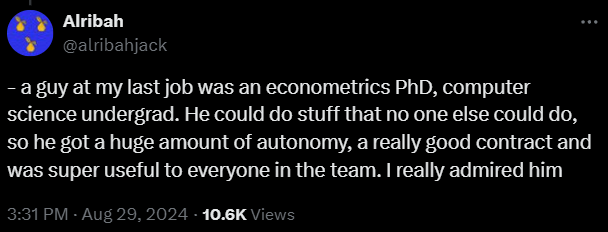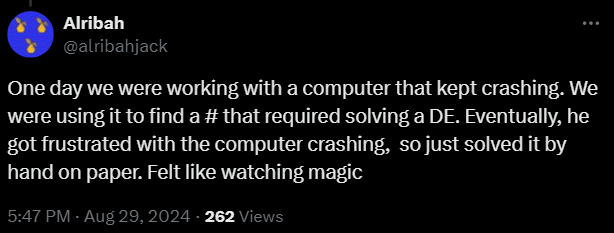The “Alien-Level Skills” Hack
You get to provide value that nobody else can, and you get recognized for it.
Want to get notified about new posts? Join the mailing list and follow on X/Twitter.
If you’re in a math-adjacent field, being really good at math can be a gigantic power-up that sets you apart.
You get to provide value that nobody else can, and you get recognized for it.
That’s what happens when you equip yourself with alien-level skills and solve problems for Earthlings.


One of the things that keeps people from capitalizing on this hack is they don’t invest in building broad math foundations.
Why not just wait to learn math until you have a job in a math-adjacent field, and then backfill all the useful math as you encounter specific problems on the job?
On the surface, that might sound like a way to reduce the amount of work that it takes to develop alien-level math skills that set you apart and boost your career.
However, in practice, this “wait to backfill” approach greatly REDUCES your chance of being able to capitalize on the “alien-level skills” hack.
Here’s why.
If you work in a math-adjacent field and don’t have much math background, then…
1) You’ll underestimate how often mathy tasks come up. Even when one does, without plenty of math background, you probably won’t realize how mathy it is.
2) Even if you do come across a task you know is mathy, you likely won’t have enough math background to even realize what mathy approach you need to take to complete the task (i.e., what specific math do you have to apply or spin up on).
3) Even if you do know what mathy approach you need to take, the task might be handed off to someone else who already has more math background (because it will take them much less time to spin up and solve the problem).
4) Even if there is nobody else to steal the task, if there is time pressure, then you might not have any time to actually carry out that mathy approach. This can happen in a couple different ways:
– 4a) defaulting to cumbersome methods:
"We don't have time for you to spin up on math for an ideal solution, we need to ship NOW. Just do the best you can in a week using what you currently know, even if it's not great, and we'll figure out a way to patch over whatever issues come up afterwards, even if the patches are complicated."
– 4b) passing up the problem:
"This would have been a great opportunity if we had someone who could solve this problem reasonably quickly, but we can't spend tons of time on it, so we're unfortunately just going to have to pass it up and focus on things that are closer to what we're able to do at the moment."
I’ll end with one caveat: depending on the field you’re going into, you typically CAN do a reasonable amount of scoping down.
For instance, if you want to work on ML/AI then you probably don’t need to learn Abstract Algebra.
But at the same time, there is still a mountain of math you’d benefit from knowing. Many topics in calculus, linear algebra, and prob/stats tend to come up, as I’ve described in detail here.
What I’m trying to say is that there’s a balance to be had. There is an appropriate level of scoping.
On one hand, you CAN skip out on math that is largely irrelevant for your math-adjacent field…
BUT whatever math tends to show up in your field in general, if you don’t have broad knowledge of it, you’re going to struggle to pull off the “alien-level skills” hack.
You can scope down and discard math that doesn’t come up in your field…
BUT if you want to pull off the “alien-level skills” hack, you should NOT scope down further and discard math that doesn’t seem to appear in a specific problem.
Want to get notified about new posts? Join the mailing list and follow on X/Twitter.